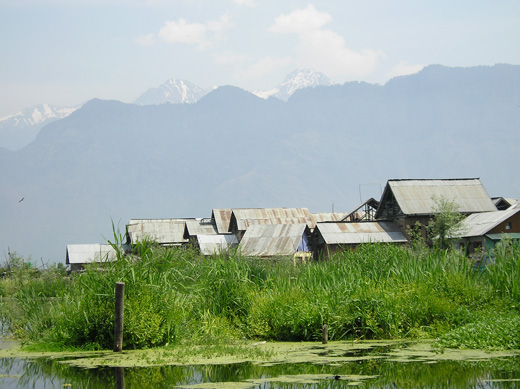
It’s hard to know exactly where to begin with India. India is a contradiction. India is an ancient enigma. India is both a temptress and thief, modern and ancient, new and old, alive and dead. India will pay for the tuk-tuk to take you away from the train station just to sell you an expensive trip to Kashmir. India will take your picture and demand to be paid when you take hers. India will promise to not sell you anything and sell you something anyway. India will leave you to sit on the roof of the houseboat floating on a lake of shit, to watch the sun set and listen to the prayer calls. India will insist that there is no problem when it is clear that there is a problem. India will tear at your heart and she will restore your hope in humanity.
See what I mean? Where do you begin with that?
So forgive me if I start with something of which I am certain: I do not like airports. There are too many people asking too many vaguely accusatory questions, too many security checks, too many regulations, too many assault weapons, and too much waiting. I get uneasy, nervous, anxious, and I’m unable to relax. The domestic terminal of the Delhi airport, where my wife and I are waiting for a flight to Srinagar, in Indian Kashmir, does nothing to relax me. I am sitting in a thick knot of humanity, the scent of which hangs in the air around me. It wafts out from the strange and frightening toilets and floats through the lobby of impatient travelers. My anxiety is not eased when I have to identify my bags on the tarmac before they will be loaded on the plane. It is a jarring reminder that Kashmir is a disputed territory and terrorism is a very real threat.
I’m not sure what has brought us to India. I had a vague, idealized notion of a romantic India: a place of magic and wonder, where a young prince meets death, illness and old age becomes an enlightened ascetic. The United States refers to itself as the melting pot, but it is India where Hindus, Muslims, Sikhs, and Christians all swirl together, mixing in a thick stew of 22 constitutionally recognized languages. Kashmir represented the crown jewel of this mystery and mysticism, a paradise on Earth, fought over by nuclear powers.
Srinagar, in the heart of the Kashmir valley, is famous for its lakes; there are sections of town with streets of water, and shikara boats ply the channels like gondolas in an Indian Venice. The interconnected lakes, Nagin and Dal, are ringed with houseboats and filled with floating vegetable and flower gardens. For centuries the town was a major tourist destination, but visitors to Kashmir have declined due to terrorism. Though tensions between India and Pakistan have eased in recent years, violence occasionally flares up. All of Kashmir is heavily militarized. Each intersection has two or three soldiers posted, assault rifles ready, and there are frequent barricades in the road made of barbed wire and sandbags. The devastating violence has left the people war-weary, ready for peace.
Lonely Planet India (LP) advises a traveler to not under any circumstances book one’s accommodations in Srinagar before leaving Delhi, because you will overpay for a houseboat that has been over-promised. LP warns travelers to not believe anyone who tells you that the tourist office is closed, that it’s somewhere else, or has burned down. My wife and I, with our week’s worth of experience in India, are certain we know much more than our guidebook. We follow the advice of a very kind tout who found us wandering around in the Delhi train station, confused and lost. He is nice enough to put us in a tuk – tuk and bring us to his friend’s travel agency.
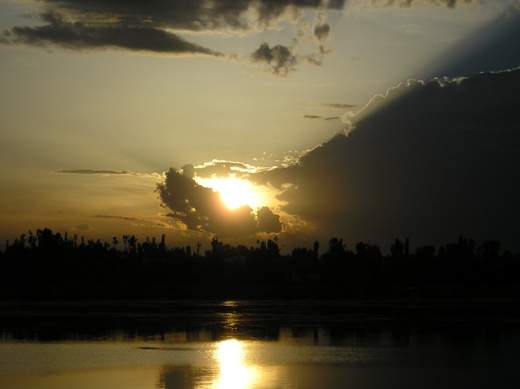
"This tourist office is closed today," he says. "I will show you."
He knows a guy who can get us a “great price.” He is doing us a favor. At the travel agency we are shown photos of a beautiful, ornate houseboat floating on a pristine lake surrounded by the snow-capped peaks of the Himalayas. It looks like paradise. It is paradise, our travel agent assures us, and he will give us a bargain price. Just because he likes us. We pay up front.
We think we are clever, because this means we’ll have a ride waiting for us at the Srinagar airport. This is what you do when traveling as a Tourist. Your transportation is arranged for you, you have an itinerary, and everything is planned out ahead of time. There is a comfort in these certainties, because you do not have to worry about where you will stay, how you will get there, what it will cost, and whether you are getting a good deal. As a Tourist, your needs are catered to by someone who has done this before.
Mustaq is a tall, bronzed man with a loping gait and a quick, wide smile. He is easygoing and instantly likable. We chat about ourselves and about Kashmir as we drive to the houseboat, where we meet Hamid, the manager of the boat.
My wife and I envisioned ourselves exploring the streets of Srinagar by ourselves, stumbling across mysterious ancient ruins or maybe the Tomb of Jesus, or visiting a mosque. It is Hamid who tells us how it will be. We may have paid for our lodging, but we hadn’t paid for anything else. Because Kashmir is a disputed territory, Hamid tells us, we are required to have a guide with us at all times. Any tours we want to go on will have to be arranged through him. For a fee. Hamid sees our blue American passports and determines that we are like washrags filled with money that he must wring out.
"Americans and Saudi Arabians have all the money," he repeats several times as we discuss our itinerary, wringing, twisting. "They can afford anything."
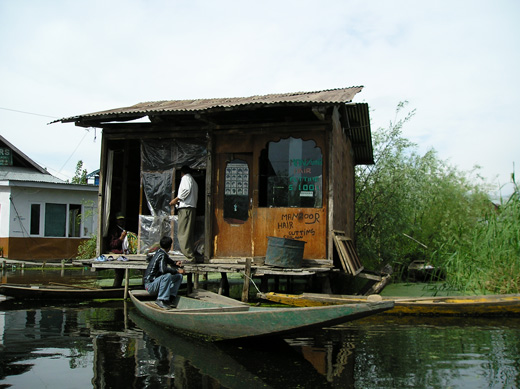
But once we are through negotiating with Hamid, he and Mustaq make it clear that we are their guests, and Mustaq proceeds to treat us with the utmost of respect and care, attending to our every need.
Despite the heavy militarization of the area, and despite giving us the hard sell at every opportunity, Kashmiris are extremely friendly, always quick to offer a cup of their milky, cardamom-flavored tea. Pakistan and India may both lay claim to Kashmir, but the Kashmiri soul is fiercely independent. The Kashmiris we meet are a proud and happy people. When we meet someone, they invariably ask, "How are you?"; "Where are you from?"; "How do you like Kashmir?", in that order.
Kashmiris often say that they live in the most beautiful place on earth, and it breaks my heart a little bit every time I hear this. In addition to the smog that hangs over the mountains, the lakes and channels are clogged with pollution. Toilets in the houseboats flush directly into the lakes, filling them with thick, nasty sludge. The streets are thick with litter. The buildings are decrepit and decaying, like broken teeth. Despite all this, you can sometimes still see Kashmir’s beauty. The Mughal Gardens burst forth with fountains and flowers, the lakes shine like jewels when the sun strikes them, and the pride of the people who live there is humbling. It is painful to see this evident beauty diminished by a lack of resources to provide adequate sanitation.
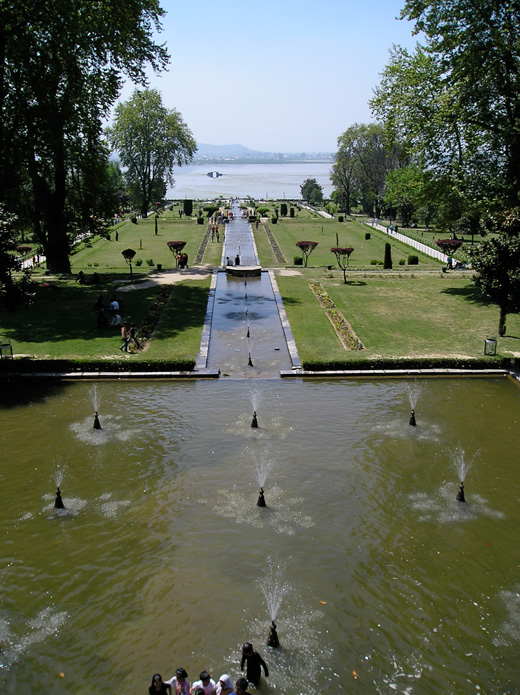
We experience Kashmir as Tourists, riding from the Hazratbal Mosque to a trek in the Himalayas in a large, white SUV, like VIPs blasting through the streets of Baghdad. We are supervised every moment we are awake by either Mustaq, Hamid, or another guide. The few moments that we are free we spend on the roof of the houseboat, playing cards and watching the sun set over Lake Nagin.
As the week wears on Mustaq becomes more relaxed with us and we get brief glimpses of the real Srinagar, the one we came to see, not the sanitized Tourist version. He takes me to get my glasses repaired on the back of his moped. My wife and I take a tuk-tuk to the bank, and when we take too long, the driver takes a detour to pick up his two kids from school, who cram into the back next to us. I am waiting for my wife outside the restroom on an unescorted trip to Chakreshwari Temple when I’m surrounded by a group of giggling young girls, who ask if I’m married, and claim me as their boyfriend. They run away with peals of laughter when my wife returns. These glimpses are enough to leave us frustrated when we deal with Hamid, who insists that we are required by law to have a guide at all times, though it is now clear that we aren’t.
When we leave Kashmir on a public bus, we cease to be Tourists. Tourists do not sit on bumpy public buses filled with bags of mail and a few other Kashmiri travelers who blow smoke at the “No Smoking” signs and stare at my wife. Tourists do not eat in cheap roadside restaurants with the locals. Tourists do not arrive at the Jammu bus station as the sun is setting with nowhere to stay and nowhere to go. We are now Backpackers.
The road between Jammu and Kashmir is narrow, and it twists around hairpin turns, dives through interminable black tunnels, and climbs over mountain passes. As we bounce around bends, I look over the edge of the roadway and down, down, down, to the Chenab River which carved the valley we are riding through. I can see the burned-out shell of a bus much like the one we are riding in at the bottom — or is that a rock? My imagination is certain, but my mind is doubtful. The bus stops several times along the road. The winding mountain track is susceptible to landslides, and a recent landslide has blocked a portion of the road; until it is cleared, traffic can only go in one direction at a time. It is eight hours before we arrive in Jammu. We spend six hours there before boarding an overnight bus to Dharamsala, home-in-exile of the Dalai Lama.
Except it isn’t exactly an overnight bus to Dharamsala. It is an overnight bus to Mandi that stops at a junction near Dharamsala. At three in the morning. The bus disgorges us and we stand on the side of the road, wondering what to do next. It is at this point that we wish we were Tourists and not Backpackers. Tourists do not stand on the side of the road in the middle of the night. Backpackers must figure things out for themselves.
There are seven of us: two Irishmen, three Englishmen, and two Americans. We stand in a rough circle and eye each other. There is one small taxi with two drivers, one of the ubiquitous silver Tata sedans, with room for maybe three of us, with gear. A few minutes of conversation reveals that we all had found ourselves on the side of the road in the middle of the night in northern India in much the same way: We’d been talked into staying on a deluxe houseboat that had perhaps once been deluxe but no longer was. We’d been swindled on carpets, cheap trinkets, textiles, saffron, and everything else we’d bought that was supposed to be real but wasn’t. My wife and I had felt like fools for the times we’d been suckered like this, and it was nice to hear that we weren’t alone.
The taxi driver wants 500 rupees each to take us into Dharamsala, which we reject as unreasonable. This is how negotiation here works: One party begins with an unreasonable offer, the other party counters with an equally unreasonable offer at the opposite end of the pricing spectrum. We offer him 50 rupees each, expecting a capitulation, but he doesn’t budge. He has us over a barrel. If he doesn’t give us a ride into town, we’ll have to walk, which at three in the morning isn’t something we want to do.
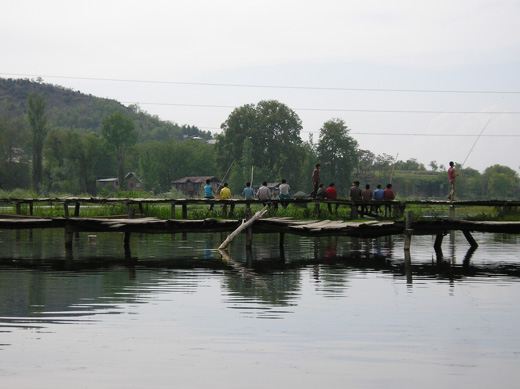
"Let’s just pay him," someone says, and the driver’s eyes light up.
"I think a bus will be along soon," says one of the Brits, James.
We continue talking about our experiences. Someone lights a cigarette and passes it around. A truck rumbles by, and the driver ignores our attempts to flag him down.
"What should we do?" someone asks.
"I think a bus will be along soon," says James.
"You said that before. Why do you think a bus will come by?"
James shrugs. "I don’t know. I heard that they have buses that run into Dharamsala from here. One will be along soon enough."
"We might be here until morning."
James shrugs again. "I think a bus will be along soon."
The taxi driver decides he’s wasting his time. He starts his car and scolds us in Hindi through his open window as he drives away. The seven of us watch with forlorn resignation as the taxi’s red taillights fade in the distance. I set my pack on the ground and sit on it. No sense standing here if we are just going to be waiting around. The two Irishmen have the same idea, but the opposite reaction. They hoist their packs and head down the road toward Dharamsala, disappearing into the dark after a few moments.
"I think a bus will be along soon."
Out of the darkness two yellow eyes gleam, growing, with a dull roar, into the headlights of a vehicle. A bus! It rolls to a stop in the intersection in front of us and the door opens. James shrugs and smiles, and we all board the bus, paying the eight rupees fare to Dharamsala.
Once we reach Dharamsala, we still aren’t at our final destination. Dharamsala is at the base of an enormous hill, one of the many foothills of the Himalayas, and above us is McCleod Ganj, home-in-exile of His Holiness, the 14th Dalai Lama of Tibet. We find the taxi drivers in Dharamsala to be much more reasonable, and soon are whipping up the steep, curving streets toward McCleod Ganj in a rusty, dented minivan.
Just shy of the crest of the hill, the taxi begins to slow. The driver stomps on the gas and the engine roars, but the van keeps slowing, rolling to a momentary stop before reversing direction and beginning to roll back down the hill. The driver steps on the brakes and kills the engine before turning to us. "The taxi is no more. It will not go."
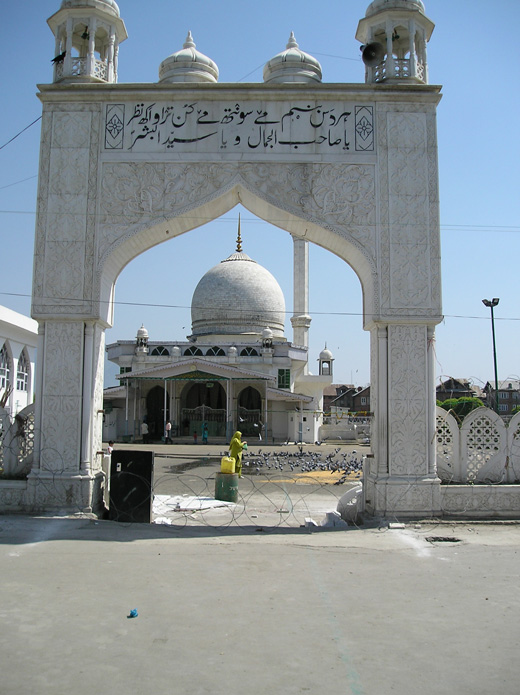
"This way?" asks James, pointing up the hill. We are no longer surprised when vehicles refuse to work, when the power goes out, when things aren’t what they seemed to be. We have come to expect such things.
"Yes. Not much farther," the cabbie replies, nodding his head.
Of course, once we reach McCleod Ganj, it is still four in the morning, pitch dark, and all of the shops and hotels are locked up tight. Stainless steel doors have been lowered and secured with padlocks. We walk up and down the empty streets, banging on hotel doors occasionally, trying to rouse someone with no success. I am starting to get discouraged when a voice calls out to us.
"Hey, over here. I have a place you can stay!"
We’d been in India long enough to be skeptical. What is this guy doing out wandering around at four in the morning? What is he up to?
Nothing, it turns out. He had heard us making noise, and came out to help. He is a Tibetan refugee and works at the International Buddhist Hostel. He offers us warm, clean beds for a fair price. He knew what it was like to be new in town, and he wanted to give us a hand. It was beautiful gesture. It was moments like these that have brought us to India.
The sun is beginning to rise as I pull the thin white sheet to my chin and drift off to sleep, but I feel exhilarated, as if a great weight had been lifted from my shoulders. We are safe, we have arrived, and we made our own way across the Indian countryside. It has forced us to interact with the population instead of observing them from behind glass. Outside our hotel room, India looms large, waiting for us. We have seen much since we left Srinagar that morning, and much more since we’d arrived in Delhi two weeks earlier, but I know, with certainty, that India still has innumerable surprises waiting for us.
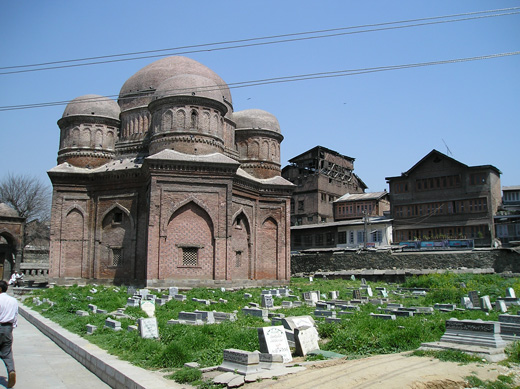
Aaron Richner I am a writer/editor turned web developer. I've served as both Editor-in-chief and Technical Developer of In The Fray Magazine over the past 5 years. I am gainfully employed, writing, editing and developing on the web for a small private college in Duluth, MN. I enjoy both silence and heavy metal, John Milton and Stephen King, sunrise and sunset. Like all of us, I contain multitudes.
- Follow us on Twitter: @inthefray
- Comment on stories or like us on Facebook
- Subscribe to our free email newsletter
- Send us your writing, photography, or artwork
- Republish our Creative Commons-licensed content

